Stern is a research professor at BU’s Frederick S. Pardee School of Global Studies and one of the world’s leading scholars of terrorism and other forms of violent extremism. The United Nations International Criminal Tribunal for the former Yugoslavia, in The Hague—the court that had sentenced Karadžić to 40 years in prison—granted her permission to interview the former Serb leader for a book she is writing examining the history behind his role in the Balkan war.
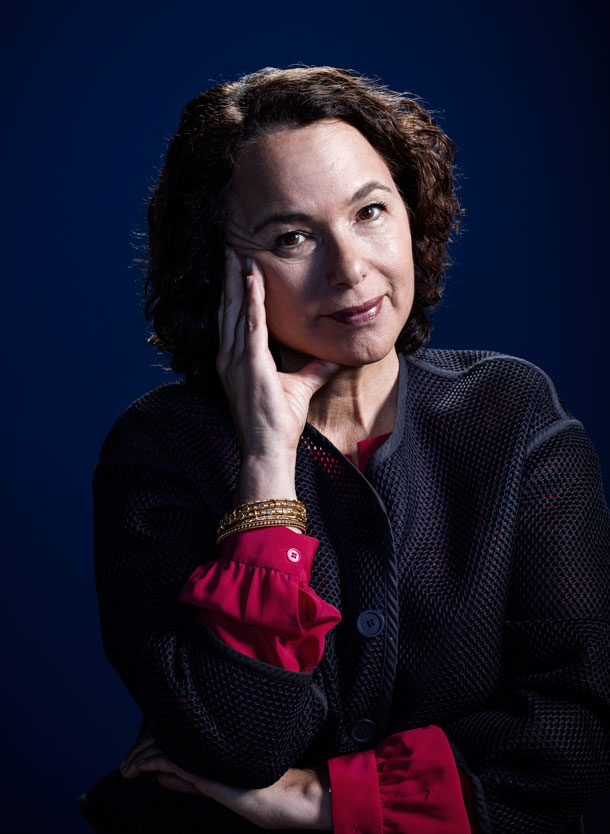
Jessica Stern has spent 20 years meeting with war criminals and terrorists, in the field and in prisons. She is one of a handful of scholars in this country who are willing to talk to terrorists.� Photo by Scott Nobles
Karadžić is a psychiatrist, a poet, and a devout Orthodox Christian. He is also a liar and a charismatic master manipulator. During his 13 years as a fugitive war criminal in Belgrade, he had transformed himself into a New Age guru. Now, in the interview room where he had been holding forth on the glorious Serb past, Karadžić abruptly announced that he wanted to show her how he’d worked as an energy healer.
“I think what he really wanted to do was to show he could dominate me,” says Stern, recalling that meeting in early 2015, a four-hour marathon so intense that even as interviewer and interlocutor parried over countless cups of coffee and tea, neither got up to use the bathroom.
Stern was pursuing her own agenda: to understand the hidden motivations behind the story Karadžić insisted upon, the story in which he is the martyred hero, forced to defend his vulnerable Serb countrymen against the powerful Bosnian Muslims conspiring to establish an Islamist state within the heart of Europe. She wanted to understand how he had been able to simultaneously justify and deny his role in overseeing a campaign of crimes against humanity—serial rape, torture, death camps, ethnic cleansing, murder—in his drive to force Bosnian Muslims and Croats out of villages considered critical to Serb interests.
Looking at him, Stern told Karadžić she was game for energy healing.
He got up from the table and stood behind her. He instructed her to hold her hands in her lap, palms up. “‘Focus on the center of your palms,’” she recalls him saying. “‘Think about God, and if you don’t believe in God, focus on someone you really love.’”
Karadžić raised his massive hands in the air, just inches above Stern’s head, and moved them, palms down, slowly apart and together, back and forth.
Meeting with Terrorists
In the 1997 film The Peacemaker, Nicole Kidman plays a government scientist based on Stern’s role at the National Security Council during the first Clinton administration, when she was director for Russian, Ukrainian, and Eurasian affairs and head of a nuclear weapons smuggling response unit. Like her movie counterpart, who chases down a nuclear weapons–stealing Bosnian terrorist with a US military intelligence officer played by George Clooney, she is brainy, fluent in Russian, hyperfocused, and pretty. Unlike Kidman’s humorless know-it-all bureaucrat, Stern is warm, self-deprecating, and quick to laugh, at herself as often as not. Her students say she’s a rock star—and a regular person. She calls herself a nerd.
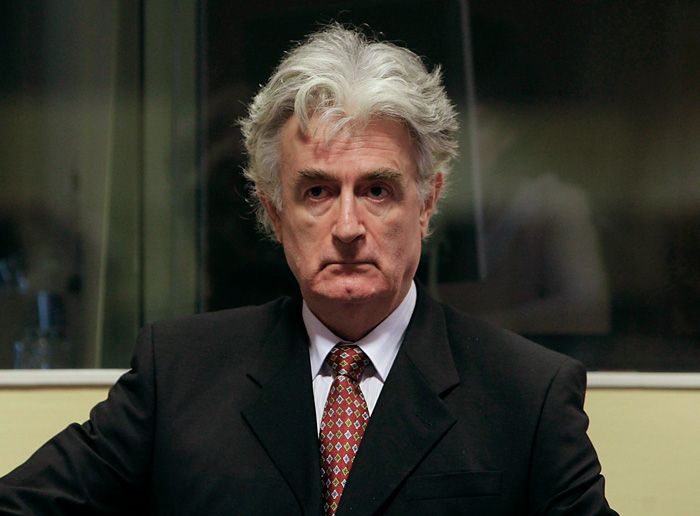
Stern was granted permission to interview Radovan Karadžić, the Bosnian Serb warlord convicted of war crimes and crimes against humanity, for a book she is writing examining the history behind his role in the Balkan war. The four-hour marathon, in 2015, was so intense that neither got up to use the bathroom. Photo by Valerie Kuypers/Associated Press
Like Karadžić, Stern is trained in the art of energy healing—Reiki, in her case—although
she didn’t tell him that. Sitting at the table with Karadžić behind her, she tried to focus on the energy flowing through her palms. “There are 8,000 dead boys and men in the room with me,” she says. It occurred to her, in passing, that Karadžić could probably strangle her if he wanted to. The guard seated just outside the door of their meeting room never even looked up from his magazine.
“He asks me, ‘What do you feel in your palms?’” says Stern. “I say, ‘Nothing.’ I see the look on his face, and I realize I got an F. I’m so devastated, and then I realize, omigod, I wanted an A from this war criminal.”
This is how Stern works. To combat evil, she writes in her book Terror in the Name of God: Why Religious Militants Kill (Ecco, 2003), it is necessary to understand it from the inside out. To combat terrorism, she believes, it is necessary to understand the motivations and grievances behind the religious and political narratives terrorists offer. To do that, she has spent more than 20 years meeting with war criminals and terrorists—Muslims, Hindus, Christians, Jews, neo-Nazis, white supremacists, anarchists—in
the field and in prisons, in Belgium, Pakistan, India, Indonesia, Jordan, Palestine, Israel, and the United States. She is one of only a handful of scholars in this country who are willing to talk to terrorists.
Monitoring her own responses during her interviews—a technique Stern honed at the Massachusetts Institute for Psychoanalysis—her mind and body become a medium, uncovering truths that may not be revealed in words. She develops insights into how violent extremists think—insights that US national security and law enforcement officials and those in other countries view as important for their work countering terrorism. That Karadžić could elicit, even in her, a feeling of wanting an A—of wanting his approval—told her something about how he had been able to persuade masses of Serbs to believe what he was telling them: that Bosnian Muslims constituted a threat.
Innate Listening Talent
People have always told Stern their secrets. She has a bachelor’s in chemistry from Barnard College, a master’s in chemical engineering and technology policy from MIT, and a doctorate in public policy from Harvard’s Kennedy School of Government. But she credits her innate listening talent, and her intense curiosity, more than her academic degrees, in serving her research.
“Jessica began writing and working on terrorism at a time when there was little research, and what was available was only of interest to a small community,” says Daniel L. Byman, a senior fellow at the Brookings Institution’s Center for Middle East Policy and a professor in Georgetown University’s Edmund A. Walsh School of Foreign Service security studies program. “She quickly emerged as deeply knowledgeable and as someone willing to take on extremely tough topics that required hard research.”
Stern, who serves on the Hoover Institution Task Force on National Security and Law, was trained to do what most academics who study terrorism do—conduct quantitative studies based on data, much of it contained in government incident reports on bombings and other attacks. In the mid-1990s, however, after a decade of working on how to keep chemical, biological, and nuclear weapons out of the hands of terrorists, she became curious about the terrorists themselves. She had been poring over the court records of Kerry Noble, a former leader of a paramilitary fundamentalist Christian group that wanted to wage war against blacks, Jews, and the US government and had been planning to poison municipal water supplies with cyanide in 1985 before law enforcement officials broke up the cult and arrested the leaders. After several years in prison, Noble had renounced the cult and been released and was living in a trailer park in Texas.
“I decided to call up Kerry Noble and ask him what he thought he was doing,” Stern recalls. “Then I went to Texas to see him. I had no training whatsoever. That’s not what people in my world did. But I wanted to understand the story from his perspective, to understand why he did what he did. You don’t understand why in a deep way from the court records.”
Over dinner at his home, Noble told Stern that he had been a sickly child who had felt humiliated by being made to take elementary school gym class with the girls. It wasn’t until he put on a paramilitary uniform that he felt like a man.
“The idea of being violent in order to feel macho—it seems so pat,” says Stern. “I didn’t expect it to be true.”
Talking with members of other violent extremist groups, she honed an ability to suspend judgment during interviews, to empathize fully—not to be confused with sympathy, she stresses—so that she could follow the mistaken logic that leads perpetrators to commit horrific acts of violence. Stern has learned that terrorists may be motivated by reasons that have little to do with religious or political ideology. They may be driven by fear, love, hate, friendship, idealism, trauma, a search for identity—or a job—a craving for adventure and glamour, or by greed for money, land, or power. For others, violence is seen as a cleansing force that purifies the world of evil. She identified perceived humiliation—either of an entire group or of an individual, as with Kerry Noble—as a strong risk factor for terrorism.
Her work is broad and versatile, and in contrast to many voices, engaging and nuanced.�
— Daniel L. Byman
In the late 1990s, she began meeting with terrorists at training camps and religious schools in Pakistan for her research for Terror in the Name of God. In summer 2000, in Islamabad, she sat on a dirty floor in an unfurnished room, drinking buffalo-milk tea with Fazlur-Rehman Khalil, whose organization was linked to al-Qaeda and who considered Osama bin Laden a friend. (Khalil was the last person bin Laden called on his cell phone before he was killed, the CIA would later discover.) He told Stern, who is Jewish, that he admired Hitler. He insisted that he wasn’t a terrorist. Stern knew that Khalil, like other terrorists, wanted to use her to broadcast his scripted public relations message. Hoping to disarm him with an innocuous question, she asked if she could meet his second wife.
To her surprise, he agreed. His house turned out to be a luxurious mansion. His beautiful young wife told Stern, in perfect English, that her family had been living in Saudi Arabia when she was introduced to Khalil. He acknowledged that he went on fundraising trips to Saudi Arabia. Stern realized he was making money off of jihad.
“I started out thinking that terrorism was 100 percent about the ideology and true believers, and I learned that there’s a spectrum,” says Stern, a member of the Aspen Homeland Security Group, a bipartisan group of experts on counterterrorism that advises the Secretary of Homeland Security. “There are some true believers, like Kerry Noble, but then there are people for whom it’s about pure profit or power. This jihadi leader was just taking advantage of ignorant youth.”
She made her last trip to Pakistan, to talk to terrorists linked to bin Laden’s group, in August 2001. A lecturer at the Kennedy School at the time, she joined a small group of experts expressing growing concerns about al-Qaeda and bin Laden. After 9/11, the field of terrorism studies expanded rapidly, Byman says, with people approaching the subject from a variety of perspectives, including economics, sociology, and criminology. “Jessica remained a go-to person for experts and laypeople alike,” he says. “Her work is broad and versatile, and in contrast to many voices, engaging and nuanced.”
Owning the Darkness
Stern, whose most recent book is ISIS: The State of Terror (Ecco, 2015), applies what she learns during her interviews to scholarly analyses across several disciplines: international relations, history, religion, political science, psychology, national security. In addition to her books, she publishes articles in academic journals and mainstream media such as the Washington Post and the New York Times.
“What Jessica really works on is why do some people take on this horrific level of violence in the name of a belief?” says Adil Najam, Pardee School dean and a College of Arts & Sciences professor of international relations and of earth and environment. “What are their motivations, their reasons, the arguments they make
to themselves?”
After Terror in the Name of God came out, Stern kept fielding the same question: wasn’t she afraid when she visited terrorist training camps in Pakistan?
Her answer was no. Why she didn’t feel afraid in such obviously dangerous situations was a question she had not yet asked herself. The answer was in her own traumatic past.
When Stern was three years old, her mother died of cancer. When she was 15, and her sister was 14, a stranger entered their Concord, Mass., home. Their stepmother was out. Their father, who was a physicist, was away on business. The stranger cut the phone lines and raped both girls at gunpoint. The Concord police seemed skeptical of their account, and for years the case
went unsolved.
Stern thought she had moved on, but in her mid-40s, she found herself feeling emotionally numb. A therapist suggested she had PTSD, a diagnosis Stern initially rejected. Around the same time, she became curious about the man who’d raped her, and she requested her case record from the Concord police. Reading the file in order to redact it, a police lieutenant named Paul Macone realized the rapist might still be at large. In 2006, he reopened the case—and with Stern’s help, solved it. It turned out that the man who raped Stern had been convicted of three other rapes, served 18 years in prison, and killed himself after his release. Based on the evidence, Macone concluded that Stern’s rapist had committed 44 rapes in Massachusetts between 1971 and 1973.
As a result of the violence and evil she’s seen,� she’s particularly appreciative of beauty� and decency and kindness.
�— Chet Atkins
Stern’s third book, Denial (Ecco, 2010), a memoir of her investigation into her rape, and her own trauma, answered the question of why she had been able to meet with terrorists in Pakistan without feeling afraid—and why she had been drawn to interviewing violent men in the first place. “I wanted to contribute to society rather than remain stuck in the past, cringing in terror,” she writes. “And yet, ironically, terror became my central preoccupation. I felt compelled to understand the deeper motivations of those who hurt others. Instead of feeling terror, I studied it.”
In writing Denial, she studied, and reexperienced, her own long-suppressed terror. After undergoing treatment for PTSD, she learned to recognize the sensation of fear. She stopped meeting with terrorists in the field—she was no longer willing to take such risks—but she continues to talk with them in prisons. “A lot of people can’t talk to perpetrators,” she says. “I’m good at it. But I can’t talk to victims. I can’t be in that space.”
Stern lives in Cambridge with her 15-year-old son, her husband, former US congressman Chet Atkins, and their two Jack Russell terriers. “There’s the dog-pajama-wearing mom and there’s this terrorist expert who probably shouldn’t be alive given the work she’s done,” says Atkins, who, as she acknowledges in Denial, helped her revisit her rape and work through her trauma. “She’s able to be, to work, to live, in two different antithetical modalities. As a result of the violence and evil she’s seen, she’s particularly appreciative of beauty and decency and kindness.”
The Mind of a Terrorist�
Think like a terrorist, Stern tells the 14 students in her Guerilla Warfare and Terrorism seminar at the Pardee School. Put yourself in their shoes. It’s the only way to understand why they do what they do. It’s also important to figuring out how to counter violent extremism, she says.
At the end of September, Stern sits at the head of the class with the day’s guest speaker, Jesse C. Morton, who recruited Americans to al-Qaeda through the Revolution Muslim website he ran out of his apartment in Brooklyn, N.Y., and was convicted of conspiracy and other charges in 2012. Morton is now involved in a US Department of Justice experiment to counter the pull of groups like ISIS and al-Qaeda and a research fellow at George Washington University’s Program on Extremism. He had read Terror in the Name of God in prison and began corresponding with Stern after he was released.
“I think we should do what Jessica does—talk to terrorists,” Morton says. “Primary source data collection is the only way to understand.”
The students pepper him with questions about his deradicalization. He talks about his debates in prison with “the BA girls”—staff from the behavioral assessment unit. “They had all their preconceived notions about how it’s all about behavior,” he says. “They’d say, ‘Ideology doesn’t mean anything.’ I’d say, ‘It’s an important thing. We live in a world of social media and ideas.’”
Stern interrupts. “But you’re an intellectual, Jesse. Not everybody drawn to jihadi groups is an intellectual like you.”
Morton flashes a grin. He says he told the BA girls that they didn’t understand anything about what had drawn him to radical Islamism. “They said, ‘Well, who do you want to talk to?’ I told them, ‘Bring me Jessica Stern. She gets it.’”
In early November, Stern is back in The Hague for three final interviews with Karadžić, who is now being held at a UN detention facility inside the maximum security prison. He is appealing his sentence, claiming he was not responsible for the killings at Srebrenica and had never read the war directives issued in his name. Stern has met with him more than a dozen times since October 2014, usually for four hours a session over three consecutive days.
“Four hours is a really long time,” she says, describing her visits to her students at their last class before Thanksgiving. “I said to my husband, ‘When is the last time we hung out and talked for four hours?’”
We see whites fearing that their privileged position as the majority is endangered in the same way Bosnian Serbs feared demographic shifts would result in their loss of majority status.
— Jessica Stern
Meeting with Karadžić the day after the 2016 US presidential election, “he tells me how happy he is that Trump won,” Stern says. “He’s totally opposed to globalization, like most terrorist groups we study. But there are many reasons to oppose globalization, and opposition is growing all over the world. This nativism versus globalization is one of the reasons for Brexit, for the rise of protectionist and far-right parties.”
She approached their final interviews with “this grandiose fantasy that I was going to be the one to get this war criminal to apologize,” she says. “I asked him, ‘What if you could say
something to the entire world about the dangers of ethnonationalism, or what you might do differently if you had to do it all over again?’
“He says, ‘I would not do anything differently. The Bosnian Muslims wanted to establish an Islamist state—a jihadi state—in the middle of Europe. I was forced to defend my people.’” Bosnian Serbs’ fears of an Islamist state were “not totally made up,” she says.
She’s not suggesting Trump could be the next Karadžić. But she does believe the lessons learned in many hours at that wooden table in The Hague have become timely.
“In some ways, this is an early version of what’s happening now all over the world, including in the United States,” she says. “We see whites fearing that their privileged position as the majority is endangered in the same way Bosnian Serbs feared demographic shifts would result in their loss of majority status. We see leaders emerging who are able to capitalize on those fears to consolidate their own power. In the case of Karadžić, his campaign to restore the greatness of Serbia—to make Serbia great again—led to mass violence. So I think it’s a very important story for us to contemplate today.”
At the end of class, Stern takes a moment to ask whether anyone in the class has no place to go on Thanksgiving. One young woman, who is from India, shyly raises her hand. “Come to my home,” says Stern, who would be cooking with friends and family. “You’ll spend Thanksgiving with us.”



































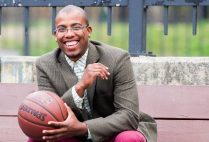

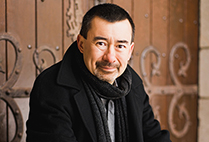
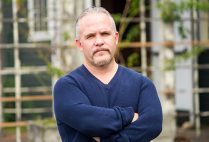








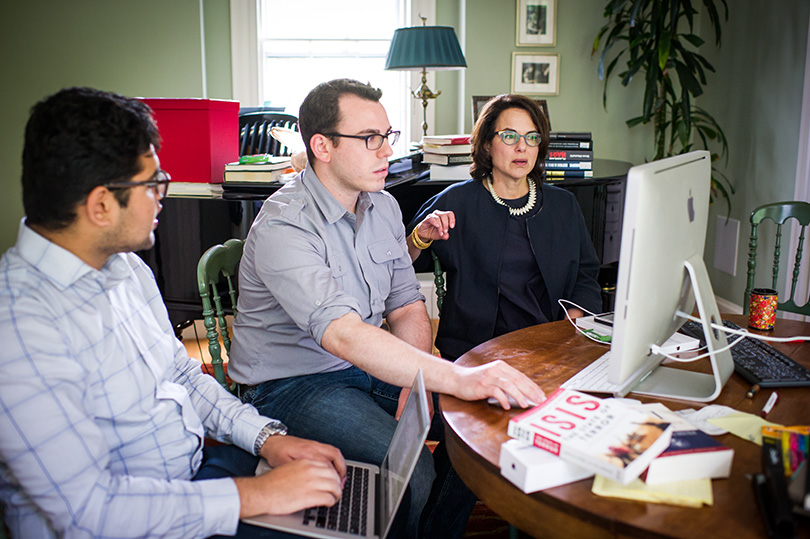
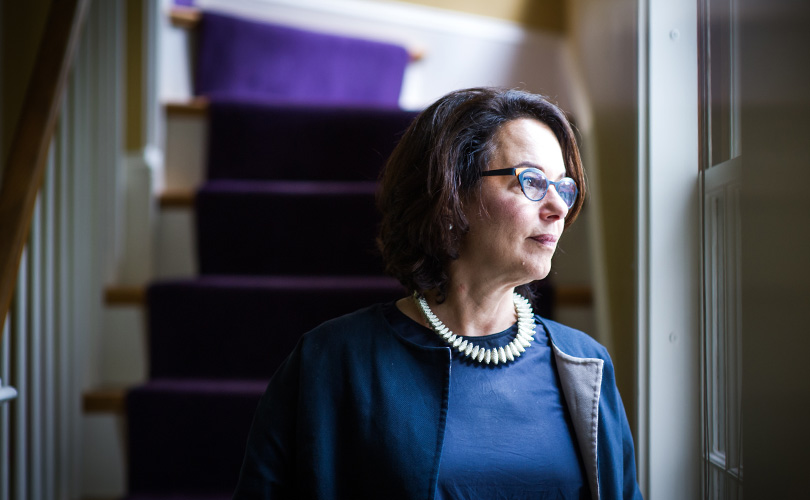


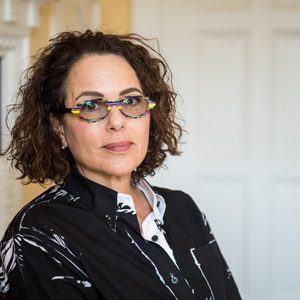
sterns contribution to scholarly in the field of terrorism is good, however her research did not clearly elaborated on the interest/role of USA in creating terrorist mostly in the Arab world. secondly the question is terrorist a political tool or religion clarity of the former is wanting.
Interesting article. However, the explanations are overly rational. After 37 years of treating murders in a prison setting I believe that wanting to obiliterate human life is a deeply emotional problem. If one truely wants to understand terrorism, one needs not to “think like a terrorist” but to “feel like a terrorist.”
Charles E Dawson MA
Clinical Psychologist (Ret.)
This article engages in flagrant historical revisionism. Short version: a man guilty of genocide says, “I had to do it because of the jihadis”, and Stern says, “oh, OK – there must be some truth there”.
Stern’s first mistake is that she makes a leap from her need for Radovan Karadzic’s approval during their discussions to his leading Bosnian Serbs into war against their neighbors. That’s an obvious logical fallacy. The second mistake is that by attributing the Bosnian War just to Karadzic, she’s ignoring a century of Serbian nationalism. Slobodan Milosevic, for example, rose to power based on a longstanding, unfounded sense of victimhood in Serbs and laid the groundwork for Karadzic. Milosevic was behind Serbia’s four wars in the 1990s (Slovenia, Croatia, Bosnia and Kosovo), and the Serbs only ousted him when he lost the last piece of Greater Bosnia. He’s not mentioned at all in the article.
Stern’s most egregious mistake is that she accepts at face value the claim by Karadzic that he was defending his people against jihadism:
‘Bosnian Serbs’ fears of an Islamist state were “not totally made up,” she says.’
Yes, they were, and Stern doesn’t present any evidence to back up that assertion, just Karadzic’s word… while he’s on trial for genocide. That’s shameful.
Yes, jihadism is a serious threat (look up Aceh in Indonesia – horrifying), and sadly, many men in the Balkans today are being drawn to jihadism. I don’t have any sympathy at all toward Islam and I think that headscarves, minarets and calls to prayer should be banned along with all proselytism, but the wars in the Balkans in the 1990s were entirely due to Serbian nationalism. Serbia didn’t attack Slovenia and Croatia because of the jihadis there. It didn’t eradicate its Jews by 1941 because of jihadism.
Thanks for the answers to my questions.
All that text and still nothing about why terrorists kill.
You’ve learned a lot and have been indoctrinated yourself.
The article was interesting until you politicized it to the Trump presidency and “white” America.
If you think we can change multitudes by hand holding, tell that to the victims for the past thousand years
“Stern tells her students to think like a terrorist.” It is not clear how one could make himself or herself to think like a terrorist. The mindset that would indiscriminately kill thousands of innocent people is not a mindset, I would argue, that most of us could duplicate. While we all are capable of getting angry in one way or another, such anger does not normally, or easily, translate into a terrorist mind. I wish the article above gave more specifics, more in-depth insight, about what Dr. Stern has found out in talking with someone like Radovan Karadzic.
Read her books.
Please don’t call a liar and manipulator a “devout Christian” of any stripe. Devout means actually changing one’s behavior to suit the tenets of one’s religion, and there is no tolerance for lies in any Christian teaching. He’s just another demagogue like the countless others throughout history professing religion as a means of cultivating power.
You’re missing the most important point of Christianity. It is tolerant of all human behavior. A central tenet, very clearly described in many places in the New Testament, is Jesus forgives those who ask him for forgiveness. This means if Hitler asked Jesus for forgiveness on Hitler’s last day on earth, he could have made it into heaven. Christianity therefore is an amoral religion.
As an attorney who has represented, and still represents, a number of convicted and accused terrorists [members of AQ] I found this pretty interesting. Stern does understand that the motivations behind individual actors in AQ or ISIL can be varied. Some can be purely self-serving and mercenary, and others can be motivated by an alternative analysis of the Quran. I think that there can be a danger, however, in relying too much on certain aspect of a “one size fits all” analysis. The evil demonstrated by Karadszic is different from the evil demonstrated by certain aspects of ISIL behavior. And the inspirational factors are different.It is important not to fall into the trap the the political philosopher Leo Strauss called reductio ad Hitlerum. Not all “evil-doers” are the same.
The United States is the biggest terrorist organization in the world. 15 years of non-stop war now. Bombing 7 countries. Overthrown the governments of Afghanistan, Iraq, Libya, attempting to in Syria. And planning for new wars against Iran, Russia, China….
Stern should interview our foreign policy establishment, the strategic planners like Kissinger, Brzezinksi, Wolfowitz, Perle. Warhawks like John McCain and Lindsey Graham. What is it that makes these people tick? Is it fear? Desire to dominate? Greed? Religion? Tribalism? Lack of empathy?
The U.S. government and its military have been raining death and destruction on the mostly Muslim population of the Greater Mid East for the past quarter century. Islamic terrorism directed at Americans are the chickens coming home to roost. Every Islamic terrorist that killed Americans in this country has clearly stated that they were motivated by revenge and retaliation. “You came to our land in order to kill our mothers, fathers, sisters, and brothers. Now, we have come to your land in order to kill your mothers, fathers, sisters and brothers.” It is astounding that the author of an article on terrorism is so clueless. Even the CIA admits that Islamic terrorism against the west is “blowback”. Of course, any American who dares to speak any truth about terrorism will never receive any government funding.
After studying for years, Stern cannot find any simplistic rational. This suggests (really demands) that there cannot be any simplistic answer to terrorism, What are the clues which suggest nuanced and individually directed responses, better tactics which might slow down movement toward fanaticism on the part of an individual or group who perceive/experience society in a particular mannmer?
Jessica’s resolve, determination and dedication to her field of study are obvious. Many of us have, or continue to experience the affects of PTSD due to varying circumstances.
Her realization of the importance of addressing this powerful obstacle, clearly provided her a launching point to step into the next phase of her dedication to helping the world better understand the complexities associated with those who view terrorism as a necessary solution.
Kudos to her continuing research, and hopefully, her published findings will produce a positive influence on others who are more limited in their knowledge about this important, and controversial topic. Our future may be more dependent on her work than people realize.
I look forward to reading her books.
Chris Kayser (MCJ ’16)
I do not have any so called White fears.. I only want the values this country has to remain in place! We have disease in this country that we have not had in decades! Every Immigrant who comes into this country needs to do it legally and be approved for admission before being allowed into the population.. Among us now is a shadow caliphate.. I am a BU grad, but my service to this nation is quite different than the majority of grads.
This article does not offer adequate suggestions to intervene in the terrorist movement here!
It is difficult to communicate with a Jihadist who is about to cut your head off, i.e, newsman James Foley. Terrorist murder regardless of supposed justification of affiliation with religious, political. cultural, etc. beliefs is unacceptable.